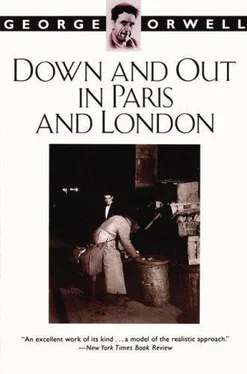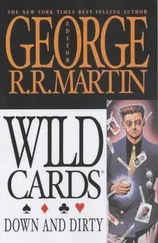George Orwell - Down and Out in Paris and London
Здесь есть возможность читать онлайн «George Orwell - Down and Out in Paris and London» весь текст электронной книги совершенно бесплатно (целиком полную версию без сокращений). В некоторых случаях можно слушать аудио, скачать через торрент в формате fb2 и присутствует краткое содержание. Жанр: Старинная литература, на русском языке. Описание произведения, (предисловие) а так же отзывы посетителей доступны на портале библиотеки ЛибКат.
- Название:Down and Out in Paris and London
- Автор:
- Жанр:
- Год:неизвестен
- ISBN:нет данных
- Рейтинг книги:5 / 5. Голосов: 1
-
Избранное:Добавить в избранное
- Отзывы:
-
Ваша оценка:
- 100
- 1
- 2
- 3
- 4
- 5
Down and Out in Paris and London: краткое содержание, описание и аннотация
Предлагаем к чтению аннотацию, описание, краткое содержание или предисловие (зависит от того, что написал сам автор книги «Down and Out in Paris and London»). Если вы не нашли необходимую информацию о книге — напишите в комментариях, мы постараемся отыскать её.
Down and Out in Paris and London — читать онлайн бесплатно полную книгу (весь текст) целиком
Ниже представлен текст книги, разбитый по страницам. Система сохранения места последней прочитанной страницы, позволяет с удобством читать онлайн бесплатно книгу «Down and Out in Paris and London», без необходимости каждый раз заново искать на чём Вы остановились. Поставьте закладку, и сможете в любой момент перейти на страницу, на которой закончили чтение.
Интервал:
Закладка:
Jacket
), and Cockney is already changing; there are few
people now who say "fice" for "face," "nawce" for
"nice" and so forth as consistently as they did twenty
years ago. The slang changes together with the accent.
Twenty-five or thirty years ago, for instance, the
"rhyming slang" was all the rage in London. In the
"rhyming slang" everything was named by something
rhyming with it-a "hit or miss" for a kiss, "plates of
meat" for feet, etc. It was so common that it was even
reproduced in novels; now it is almost extinct.' Perhaps
all the words I have mentioned above will have van-
ished in another twenty years.
The swear words also change-or, at any rate, they are
subject to fashions. For example, twenty years ago the
London working classes habitually used the word
"bloody." Now they have abandoned it utterly, though
novelists still represent them as using it. No born
Londoner (it is different with people of Scotch or Irish
origin) now says "bloody," unless he is a man of some
education. The word has, in fact, moved up in the social
scale and ceased to be a swear word for the purposes of
the working classes. The current London adjective, now
tacked on to every noun, is ---------
. No
doubt in time---, like "bloody," will find its way into
1 It survives in certain abbreviations, such as "use your
twopenny" or "use your head." "Twopenny" is arrived at like
this: head-loaf of bread-twopenny loaf-twopenny.
the drawing-room and be replaced by some other word.
The whole business of swearing, especially English
swearing, is mysterious. Of its very nature swearing is
as irrational as magic-indeed, it is a species of magic.
But there is also a paradox about it, namely this: Our
intention in swearing is to shock and wound, which we
do by mentioning something that should be kept secret -
usually something to do with the sexual functions. But
the strange thing is that when a word is well established
as a swear word, it seems to lose its original meaning;
that is, it loses the thing that made it into a swear word.
A word becomes an oath because it means a certain
thing, and, because it has become an oath, it ceases to
mean that thing. For example, ----. The Londoners do
not now use, or very seldom use, this word in its
original meaning; it is on their lips from morning till
night, but it is a mere expletive and means nothing.
Similarly with -------, which is rapidly losing its original
sense. One can think of similar instances in French-for
example,------,, which is now a quite meaningless
expletive. The word---
, also, is still used
occasionally in Paris, but the people who use it, or most
of them, have no idea of what it once meant. The rule
seems to be that words accepted as swear words have
some magical character, which sets them apart and
makes them useless for ordinary conversation.
Words used as insults seem to be governed by the
same paradox as swear words. A word becomes an
insult, one would suppose, because it means something
bad; but in practice its insult-value has little to do with
its actual meaning. For example, the most bitter insult
one can offer to a Londoner is "bastard"which, taken for
what it means, is hardly an insult at all. And the worst
insult to a women, either in London
or Paris, is "cow"; a name which might even be a com-
pliment, for cows are among the most likeable of animals.
Evidently a word is an insult simply because it is meant as
an insult, without reference to its dictionary meaning;
words, especially swear words, being what public opinion
chooses to make them. In this connection it is interesting
to see how a swear word can change character by crossing
a frontier. In England you can print «
Je m'en fous »
without protest from anybody. In France you have to print
it "
Je m'en f-----" Or, as another example,
take the word "barnshoot"a corruption of the Hindustani
word
bahinchut . A vile and unforgivable insult in India, this
word is a piece of gentle badinage in England. I have even
seen it in a school text-book; it was in one of
Aristophanes' plays, and the annotator suggested it as a
rendering of some gibberish spoken by a Persian
ambassador. Presumably the annotator knew what
bahinchut
meant. But, because it was a foreign word, it had
lost its magical swear-word quality and could be printed.
One other thing is noticeable about swearing in
London, and that is that the men do not usually swear in
front of the women. In Paris it is quite different. A
Parisian workman may prefer to suppress an oath in front
of a woman, but he is not at all scrupulous about it, and
the women themselves swear freely. The Londoners are
more polite, or more squeamish, in this matter.
These are a few notes that I have set down more or less
at random. It is a pity that someone capable of dealing
with the subject does not keep a year-book of London
slang and swearing, registering the changes accurately. It
might throw useful light upon the formation, development
and obsolescence of words.
XXXIII
THE two pounds that B. had given me lasted about ten
days. That it lasted so long was due to Paddy, who had
learned parsimony on the road and considered even one
sound meal a day a wild extravagance. Food, to him, had
come to mean simply bread and margarine -the eternal tea-
and-two-slices, which will cheat hunger for an hour or
two. He taught me how to live, food, bed, tobacco and all,
at the rate of half a crown a day. And he managed to earn
a few extra shillings by "glimming" in the evenings. It
was a precarious job, because illegal, but it brought in a
little and eked out our money.
One morning we tried for a job as sandwich men. We
went at five to an alley-way behind some offices, but there
was already a queue of thirty or forty men waiting, and
after two hours we were told that there was no work for
us. We had not missed much, for sandwich men have an
unenviable job. They are paid about three shillings a day
for ten hours' work-it is hard work, especially in windy
weather, and there is no skulking, for an inspector comes
round frequently to see that the men are on their beat. To
add to their troubles, they are only engaged by the day, or
sometimes for three days, never weekly, so that they have
to wait hours for their job every morning. The number of
unemployed men who are ready to do the work makes
them powerless to fight for better treatment. The job all
sandwich men covet is distributing, handbills, which is
paid for at the same rate. When you see a man distributing
handbills you can do him a good turn by taking one, for he
goes off duty when he has distributed all his bills.
Meanwhile we went on with the lodging-house life-
a squalid, eventless life of crushing boredom. For days
together there was nothing to do but sit in the under-
ground kitchen, reading yesterday's newspaper, or, when
one could get hold of it, a back number of the
Union Jack .
It rained a great deal at this time, and everyone who came
in steamed, so that the kitchen stank horribly. One's only
excitement was the periodical tea-and-two-slices. I do not
know how many men are living this life in London-it must
Читать дальшеИнтервал:
Закладка:
Похожие книги на «Down and Out in Paris and London»
Представляем Вашему вниманию похожие книги на «Down and Out in Paris and London» списком для выбора. Мы отобрали схожую по названию и смыслу литературу в надежде предоставить читателям больше вариантов отыскать новые, интересные, ещё непрочитанные произведения.
Обсуждение, отзывы о книге «Down and Out in Paris and London» и просто собственные мнения читателей. Оставьте ваши комментарии, напишите, что Вы думаете о произведении, его смысле или главных героях. Укажите что конкретно понравилось, а что нет, и почему Вы так считаете.












